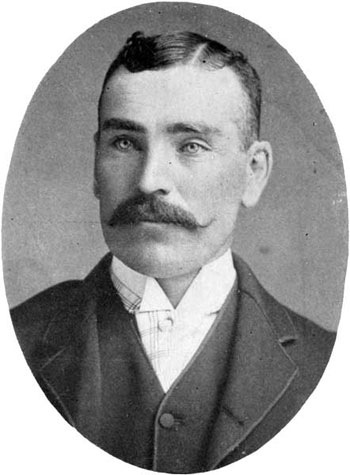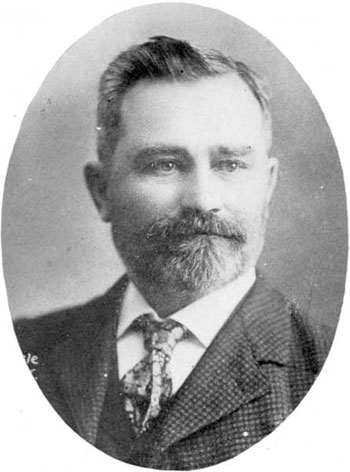
EARLY POLITICIANS
| Fletcher,
Samuel Biography: (1858 – 1950) m. (1886) Elizabeth Smith (1860 – 1952) Claims: Settled in 1886. In 1920 Samuel Fletcher was elected to the Manitoba Legislature with the first group of Progressive Farmers. Probable Significance: Medium Source: Trails & Crossroads to Killarney p. 340 / Reflections p. Lawrence, George  Biography: (1855-1924) Claims: George and his brother Noble set out in 1879 and took homesteads near Glenora. He saw that money could be made by bringing out horses, and made several trips east to return with carloads of horses for sale. He opened a Massey Harris agency in Glenora and later in Killarney. In 1899 he was the elected to represent the Killarney riding until he was defeated when the Roblin government was overthrown in 1915. From 1911 to 1915 he was Minister of Agriculture. In that role he oversaw the establishment of the Killarney Demonstration Farm. After his defeat opened an implement business of his own. He acquired considerable land in various parts of the province. President of the Southern Manitoba Agricultural and Arts Association and a member of the Church of England, the Orange Order, the Black Knights of Ireland, and the Odd Fellows Lodge. About 1922 he and his wife (Phoebe Coughlan) went to California. He is commemorated by the RM of Lawrence. Probable Significance: Source: Trails to Killarney p / Reflections p. 388 From the Local History Sources... GEORGE LAWRENCE (1855-1924) was born on a bush farm near Uxbridge, Ontario. He was the fourth son in a family of seven sons and one daughter. Three of the sons, Joseph, George and Christopher, came eventually to the Killarney district. From the time the boys were ten years old they hired out with neighbors to make enough money to attend school in winter. Wages were as low as $5 a month; later they got $10 and in 1881 Tom earned a record $16 a month. When the Dominion Lands Act was passed, the boys read in the local newspaper about the 160-acre homesteads and pre-emptions available in Manitoba. For lads who had grown up on a bush farm this seemed heaven-sent; they all wanted to go. They realized they did not have enough money, so they saved from their meagre wages. George and Noble set out in 1879 and took homesteads near Glenora. Having a shrewd head for business, George saw that money could be made by bringing out horses, and made several trips east to return with carloads of horses for sale. Disregarding the fears of neighbors that they would be eaten by wolves or scalped by Indians, likewise the warning from one who had been to Manitoba about swarms of mosquitoes and insects as large as birds, William, Thomas, Christopher and John left for Glenora in 1884 and took up homesteads there. George Lawrence rented his farm to Thomas and went into the business of selling implements. He opened a Massey Harris agency in Glenora and later in Killarney. In the provincial elections of 1892 and 1896 he was the Conservative candidate, but failed to defeat the sitting member, Finlay M. Young, until 1899, when he won by 140 votes. He continued to represent the Killarney riding until he was defeated when the Roblin government was overthrown in 1915.. From 1911 to 1915 he was Minister of Agriculture. He resigned from his position with Massey Harris when con- : testing the 1892 election, and after his defeat opened an implement business of his own. He acquired considerable land in various parts of the province, and in partnership with his brother Christopher had a large ranch at Cochrane, Alberta, for a few years. At one time he was President of the Southern Manitoba Agri-cultural and Arts Association, located at Killarney. He was a member· of the Church of England, the Orange Order, the Black Knights of Ireland, and the Odd Fellows Lodge. About 1922 he and his wife (Phoebe Coughlan) went to California. Their only son, Desmond, died in 1962. George and Noble came in 1878 by boat to Duluth, train to Crookston and paddle-wheeler down the Red to Emerson. (The railway from St. Paul to Winnipeg was not completed until December of that year). They parted company - George with only 15<1: went on to Winnipeg and Noble with ox cart, tools and provisions set out for Nelsonville (that short-lived town) to file for land at Glenora. George followed the next spring and like Noble cooked his bannocks and slept under his cart. One morning he found his hair was frozen to the ground. He filed across the road from Noble and they were joined by William, Thomas, Chris and John in 1881 all homesteading nearby. George Lawrence made several trips to Ontario to bring out horses for sale and also brought a wooden grain separator - a great boon to the settlers. In response to the demand for machinery he set up an agency for the Massey Co (1883). In 1886 George rented his farm to Thomas and moved his agency to Killarney. He resigned in 1892 to contest the constituency of Killarney for the Conservatives in the provincial elections. After his defeat by the incumbent Finlay Young he opened an implement business of his own with JM Baldwin, handling implements for several companies. In 1899, and four successive elections, George was a successful Conservative candidate, representing his constituency for 15 years. In 1911, he was appointed Minister of Agriculture and Immigration. His empty seat on his acceptance of a cabinet position was returned to him by acclamation in a by-election in October of that year. As Minister of Immigration he set up immigration offices in England, Ireland, and Scotland. His wife, Miss Phoebe Coughlan, was the daughter of a prominent tea merchant of Dublin. They were married in All Saints Church, Winnipeg, on September 12, 1904. One son, Desmond George Lloyd, was born in 1907 Hon George Lawrence retired from public life when he was defeated by Mr S M Hayden in the 1915 elections. During his time in office, George kept abreast of all matters affecting the development of agriculture in the Province and maintained an interest in farming. He owned three farms in the Killarney District, two south of the town and one to the north which he sold to Mr Wilbert Worden. He was president of the Southern Manitoba Agricultural and Arts Association located in Killarney and encouraged the holding of agricultural fairs. He was instrumental in having the railway put through from Greenway to Wakopa through government negotiations with the CNR. He also sponsored a bill called the Cor- poration Tax Act to lighten the unfair load of taxation on the farmers. He sincerely believed it was the duty of a member of parliament to do his best for the division he represented and for the province. He strove to be as fair to his opponents as to his own party. Fraternally he was a member of the Independent Order of Foresters and belonged to the Loyal Orange Lodge. He was a member of the Church of England. After several years spent in BC, the family took up residence in Berkeley, California, where Desmond enrolled in the University, later attending Oxford where he married. After graduating in Law he returned to Berkeley to practice his profession. Hon George Lawrence died on May 25th, 1924 at age 69. His widow died about seven years later. His son, Desmond, died in 1966 at the age of 59. There are no descendants. Young, Finlay McNaughton  Biography: b. Quebec. (1852-1916) 1891 he married Louisa Nicolson Claims: Farmer.Pioneer. MLA Came west in 1879 to Wakopa. Founded the Young Grain Company which operated nineteen elevators in Southwestern Manitoba until 1921 when it was sold to N. M. Paterson and Sons. In partnership with Thomas Buck they established a grist mill in Killarney which could handle 100 bags of flour a day. Elected MLA in 1883. Moved to Killarney in 1888. Appointed to the Senate in 1900. Probable Significance: Source: Reflections P. From the Local History Sources... He moved to Killarney in 1888 and built a large house, later a nursing home, on the corner of Clarke and Finlay. Farmer, MLA (1883-1886), MLA (1886-1888), MLA (1888-1892), MLA (1892-1895), MLA (1896-1899), Senator. Born at St. Chrysostome, Chateauguay County, Quebec, in 1852, the son of farmer Duncan Young. In 1882, with his brothers, Charles A. Young, Fred W. Young and Duncan D. Young, he came to Manitoba and homesteaded at Wakopa in the Turtle Mountain district. He farmed there for several years, later acquiring a number of farms in the Killarney district. He entered the grain business, was a member of the Young Grain Company and part owner with Thomas H. Buck of the mill at Killarney. He married Louisa Nicholson of Valleyfield, Quebec. He was elected to the Manitoba Legislature in 1883 and 1886 for Turtle Mountain. In 1888 he was acclaimed in the new constituency of Killarney and was re-elected in 1892 and 1896. From 1896 to 1899 he was Speaker of the Legislative Assembly in the Greenway government. Defeated in the 1899 general election, he was appointed to the Senate on 30 January 1900, serving until his death, which occurred at Killarney on 16 February 1916. The YOUNG brothers, FINLAY, CHARLES, DONALD, and FREDERICK came from a stone-strewn farm near St. Chrysostome, Quebec. They homesteaded but none of them remained active farm- ers for long. Finlay went into politics in 1883; some of them were directors of the steam-powered creamery which John Hettle estab- lished on Sharpe's Creek near Wakopa in 1885. They founded the Young Grain Company which operated nineteen elevators in South- western Manitoba until 1921 when it was sold to N. M. Paterson and Sons. In partnership with Thomas Buck they established a grist mill in Killarney which could handle 100 bags of flour a day. FINLAY McNAUGHTON YOUNG came west in 1879 accom- panied by his brother Charles and Philip Scott. They bought a team of oxen for $165 and a second hand wagon for $25 and set out along the Commission Trail. They filed for land in Township 2, Range 11, but, meeting a group who were on their way to Turtle Mountain where they said wood, logs and game were plentiful, Finlay Young and Philip Scott decided to look this land over, and left Charles in charge of their camp. Finlay Young and Philip Scott decided in favour of the Wakopa area and Scott went back to inform Charles. They squatted on their chosen homesteads until the Land Office opened in August, 1880, when Finlay Young filed for NW 20-1-18 and soon added to his holdings. Running as a Liberal he was elected in 1883 and again in 1886 to represent Turtle Mountain in the Provincial Legislature. In the elections of 1888, 1892, and 1896 he was elected in the newly formed constituency of Killarney, serving as speaker during his last term. In the election of 1899 George Lawrence defeated him, but he remained in public life, for he was appointed to the Senate in 1900. He moved to Killarney in 1888 and built a large house, now a nursing home, on the corner of Clarke and Finlay. In 1891 he married Jane Nicolson of Valleyfield, Quebec . |